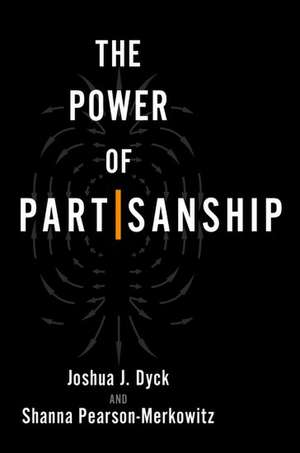The Power of Partisanship
Autor Joshua J. Dyck, Shanna Pearson-Merkowitzen Limba Engleză Paperback – 28 sep 2023
Preț: 128.21 lei
Preț vechi: 147.00 lei
-13% Nou
Puncte Express: 192
Preț estimativ în valută:
24.54€ • 26.67$ • 20.63£
24.54€ • 26.67$ • 20.63£
Carte disponibilă
Livrare economică 20-26 martie
Livrare express 14-20 martie pentru 42.89 lei
Preluare comenzi: 021 569.72.76
Specificații
ISBN-13: 9780197623794
ISBN-10: 0197623794
Pagini: 256
Dimensiuni: 158 x 236 x 16 mm
Greutate: 0.37 kg
Editura: Oxford University Press
Colecția OUP USA
Locul publicării:New York, United States
ISBN-10: 0197623794
Pagini: 256
Dimensiuni: 158 x 236 x 16 mm
Greutate: 0.37 kg
Editura: Oxford University Press
Colecția OUP USA
Locul publicării:New York, United States
Recenzii
Dyck and Pearson-Merkowitz conduct a wide-ranging investigation into the effects of partisanship. Drawing on surveys and an array of other data, they show that partisanship and partisan cues shape attitudes, behaviors, and preferences across a huge range of domains, extending well beyond the political realm. This creative and thought-provoking study illuminates the drivers of growing affective polarization in society, as well as the challenges facing American democracy ahead.
This book convincingly demonstrates how partisanship distorts our view of the world. Through a series of well-designed experiments, Dyck and Pearson-Merkowitz show how our responses to partisan signals affects everything from the politicians and policies we support to the foods we like. They also reveal how independent voters may be both more savvy than often portrayed and better able than partisans to realistically assess the world. This book is vital for those seeking to understand partisanship and its role in our political system.
In this groundbreaking book, Dyck and Pearson-Merkowitz go beyond the well-tread domain of how partisanship affects politics to document how deep the influence of affective attachments to parties has become. The pair make two key contributions. First, they document that partisanship has become so toxic that the ameliorative power of positive intergroup contact—long thought to reduce intergroup animosity—has little impact on how we view out-partisans. Second, they question the value of measures of political knowledge. As what we know about politics has become endogenous to partisanship, the political science canon about how political knowledge affects political preferences becomes upended and in need of revision. A must-read for students of American politics today.
This is an important cautionary tale, well supported by the authors' evidence... Highly recommended. Advanced undergraduates through faculty; professionals.
This is an important cautionary tale, well supported by the authors' evidence.
This book convincingly demonstrates how partisanship distorts our view of the world. Through a series of well-designed experiments, Dyck and Pearson-Merkowitz show how our responses to partisan signals affects everything from the politicians and policies we support to the foods we like. They also reveal how independent voters may be both more savvy than often portrayed and better able than partisans to realistically assess the world. This book is vital for those seeking to understand partisanship and its role in our political system.
In this groundbreaking book, Dyck and Pearson-Merkowitz go beyond the well-tread domain of how partisanship affects politics to document how deep the influence of affective attachments to parties has become. The pair make two key contributions. First, they document that partisanship has become so toxic that the ameliorative power of positive intergroup contact—long thought to reduce intergroup animosity—has little impact on how we view out-partisans. Second, they question the value of measures of political knowledge. As what we know about politics has become endogenous to partisanship, the political science canon about how political knowledge affects political preferences becomes upended and in need of revision. A must-read for students of American politics today.
This is an important cautionary tale, well supported by the authors' evidence... Highly recommended. Advanced undergraduates through faculty; professionals.
This is an important cautionary tale, well supported by the authors' evidence.
Notă biografică
Joshua J. Dyck is Professor and Chair of the Political Science Department and Director of the Center for Public Opinion at the University of Massachusetts Lowell. He is co-author of Initiatives without Engagement. Shanna Pearson-Merkowitz is Saul I. Stern Professor of Civic Engagement and Associate Dean of Faculty Affairs in the School of Public Policy at the University of Maryland.
